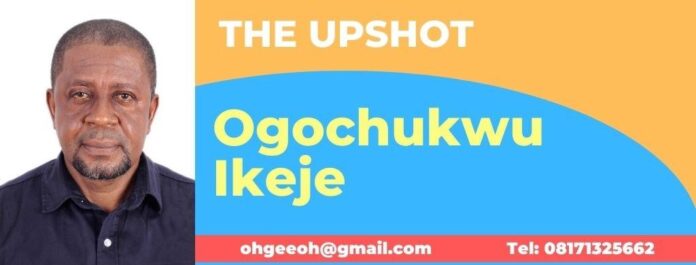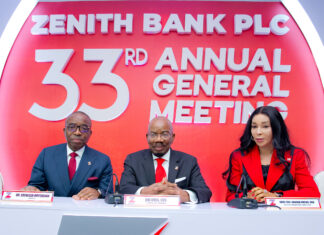Did Mr. Vice President, Kashim Shettima, deny Nigeria’s poverty in order to be politically correct? Or was he sounding off, trying to project a bullish Nigerian economy to impress the besotted international community? He needn’t have bothered. They are not fooled. The international community has our numbers. They know Nigeria is very poor, and so do we.
By Ogochukwu Ikeje
Is there a polite way to respond to Vice President Kashim Shettima’s assertion on television last week that Nigeria is not poor? In a sit-down with Reuben Abati of Arise News Channel, in Davos, Switzerland, during the just-ended World Economic Forum (WEF), Mr. Shettima declared: “We are not a poor nation by any standard. We are not a poor continent. We want to deal with people on a pedestal of equality. We do not come to the West with a begging bowl. No we want to deal with them on mutually-beneficial terms because ours is the richest continent in the world. The whole countries of Europe, their resources are not up to the resources in the Democratic Republic of Congo.”
Is there a nice way to respond to that without saying he lied? Well, yes. You could say that Mr. Shettima never knew or felt poverty, or if he did, it must now be a hazy, distant memory. Mr. Vice-President, 57, has been living off state cash since 2007, when he was appointed commissioner for finance in his home state of Borno. He would become governor, then senator, and now vice president. But even before 2007, he was in the bank, for many years, rising to the position of manager. There was no way he could feel poverty, and what you can’t feel, you can’t quite understand. So when he says Nigeria is not a poor nation, he is probably speaking from a personal perspective. If he were to ease himself out of his cozy residence, and out of his comfortable car, and step into the streets, he would meet some of the 130 million compatriots living in multidimensional poverty. That figure was provided by the National Bureau of Statistics (NBS), a state agency. The street people would tell him that they know what poverty feels like. And that they are poor whichever direction they faced. Left, right, front or back, they are poor. Isn’t that what multidimensional poverty means in simple terms?
And you can’t quite say words let Mr. Shettima down either. For he took a degree in Agricultural Economics in the University of Maiduguri, and took a Master’s in Agricultural Economics in the University of Ibadan, then went on to teach, you guessed it, Agricultural Economics in the University of Maiduguri. So please don’t say he did not know how to couch his words.
Now the questions. Did Mr. Shettima deny Nigeria’s poverty in order to be politically correct? Or was he merely reading off a script drafted by his principal back in Aso Rock? Or was he sounding off, trying to project a bullish Nigerian economy to impress the besotted international community? He needn’t have bothered. They are not fooled. The international community has our numbers. They know Nigeria is very poor, and so do we. They know we are scarcely more than a raw-material country, a consuming nation.
READ ALSO: Things not getting Betta
Five failings of Nigerian presidents
They know that if we give them maize, for instance, they pop it, add some colouring and flavours, package it and send it back to us in containers with dizzying price tags. We send them potatoes, they clean them up, chip them and ship them back to us in well-designed packs to flood our supermarket shelves. They know that since independence in 1960 we have not quite mastered how to extract our crude oil by ourselves, to say nothing of refining it, so they come in to do the job, then take it away and bring it back as petrol and diesel, at great cost to us. The international community knows that we can’t quite build a solid kilometre of road that will last for five years, despite the huge number of civil engineers we churn out every year from our universities, so they come in with their people to do the job. They also know that Nigerians are fleeing their country in droves. They know that we are neck-deep in debt and frying in corruption. They know that we go to them with our begging bowls. They know us inside out.
Mr. Shettima says the whole of Europe doesn’t have the resources that DR Congo, or Nigeria, has. That may well be true, but it has been said that it is not what you eat that makes you big, but what you digest? It is not the bitumen, or the iron ore, or the crude oil you have that will develop your country; it is what your country does with what it has. And for as long as things remain so, the country will remain poor, no matter what Mr. Shettima, unusually dressed up in a jacket and tie, says to the contrary. That hurts.
What hurts most is the fact that Nigeria’s poverty is the making of its leaders. Before he left office, after eight painful years, President Buhari, aloof and distant as he was, conceded that the level of poverty in the land was unimaginable. Eight months into the succeeding administration, Mr. Vice-President, who said in the campaign days that they would fix poverty, has denied the very problem he promised they would solve. But it is a denial Nigerians are painfully familiar with. Their leaders, safe and secure in their cocoons, cannot feel what they feel.











